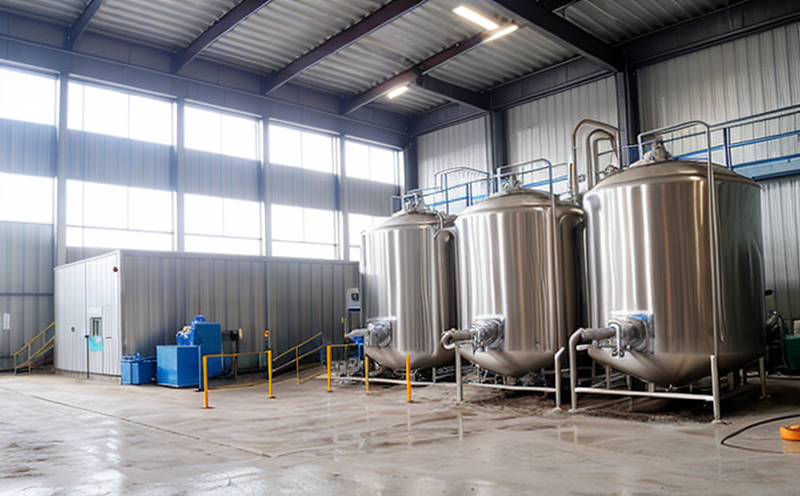ASTM D5673 Boron Test in Industrial Water
The ASTM D5673 boron test is a critical analytical procedure used to determine the concentration of boron in industrial process water. This test is essential for ensuring that water quality meets both internal standards and external regulatory requirements. In industries such as electronics, pharmaceuticals, and semiconductor manufacturing, water purity is paramount due to the potential contamination from trace elements like boron.
Boron can have significant impacts on the performance of sensitive equipment and processes. For instance, in semiconductor fabrication, even low concentrations of boron ions can interfere with the electrical properties of silicon wafers, leading to defects that affect product yield and reliability. In the pharmaceutical sector, trace amounts of boron could contaminate drug formulations, necessitating stringent quality control measures.
The ASTM D5673 test method provides a standardized approach for measuring boron in water samples through potentiometric titration using ammonium hydroxide. This method is chosen for its precision and repeatability, ensuring that results are consistent across different laboratories and batches of samples.
Sample preparation for the ASTM D5673 test involves collecting a representative sample of industrial process water in glass containers to avoid contamination from metal ions. The sample should then be filtered through a 0.45 micrometer filter to remove particulates that might interfere with the titration process. After filtration, the solution is ready for analysis using the specified potentiometric titration technique.
The test apparatus required includes a pH meter capable of accurate measurement down to very low pH levels, along with appropriate electrodes and reagents as per ASTM D5673 standards. The acceptance criteria for this method are based on the precision and accuracy outlined in the standard, which ensures that results are reliable and can be trusted by industry stakeholders.
The importance of the ASTM D5673 boron test cannot be overstated, especially for industries where water purity is a critical factor. By adhering to this standardized procedure, companies can maintain compliance with internal quality control standards as well as external regulatory requirements such as ISO 9001 and ISO/IEC 17025.
Implementing the ASTM D5673 test allows for early detection of potential issues in water quality, which is crucial for preventing costly disruptions to production processes. This proactive approach helps ensure that industrial facilities operate efficiently and maintain high standards of product quality.
- Precision: The potentiometric titration method provides highly accurate measurements.
- Reliability: Standardized procedures reduce variability in test results.
- Compliance: Ensures adherence to industry and regulatory standards like ISO and ASTM.
- Precision: Minimizes errors due to environmental factors or human error.
- Absence of contamination: Use of glass containers ensures that metal ions do not interfere with the test results.
In summary, the ASTM D5673 boron test is a vital tool for maintaining water quality in industrial settings. By employing this method, businesses can ensure that their processes remain efficient and compliant, thereby reducing risks associated with poor-quality water.
Benefits
The benefits of conducting the ASTM D5673 boron test extend beyond mere compliance; they significantly enhance operational efficiency and product quality. For starters, regular monitoring ensures that industrial facilities maintain consistent water purity levels, which is essential for avoiding production downtimes caused by contaminated water.
By identifying and addressing boron contamination early on, companies can prevent costly repairs or replacements of equipment that are sensitive to trace elements like boron. This proactive approach not only saves money but also extends the lifespan of critical assets within the facility.
The ASTM D5673 test also supports environmental stewardship by helping industries manage their water usage more effectively. By optimizing water treatment processes, companies can reduce waste and lower overall consumption, contributing positively to sustainability initiatives.
From a regulatory standpoint, compliance with standards like ISO 9001 and ISO/IEC 17025 is crucial for maintaining credibility in the market. Meeting these requirements not only helps avoid fines or penalties but also strengthens customer trust and satisfaction.
In addition to meeting external regulations, internal quality control measures provided by ASTM D5673 contribute to building a culture of excellence within an organization. Employees who understand the importance of water purity are more likely to take ownership of their roles, leading to improved overall performance across all departments.
Environmental and Sustainability Contributions
The ASTM D5673 boron test plays a crucial role in environmental protection by ensuring that industrial processes do not contribute to water pollution. By maintaining strict control over boron levels, industries can minimize their ecological footprint and comply with environmental regulations.
Boron contamination in natural waters can have adverse effects on aquatic ecosystems, affecting the health of fish and other organisms. By adhering to ASTM D5673 standards, industrial facilities contribute positively towards preserving these ecosystems. This contributes not only to regulatory compliance but also enhances corporate social responsibility (CSR) efforts.
Moreover, the reduction in water usage through optimized processes supported by ASTM D5673 helps conserve valuable resources. Efficient use of water is a key component of sustainable practices, which benefits both the environment and long-term business sustainability.
The commitment to environmental stewardship through rigorous testing like ASTM D5673 aligns with broader global initiatives aimed at reducing industrial impacts on the planet. By integrating such practices into daily operations, companies demonstrate leadership in responsible resource management.





